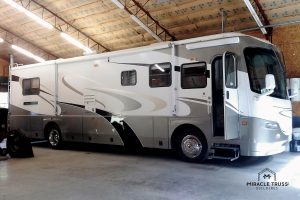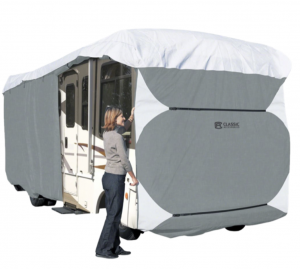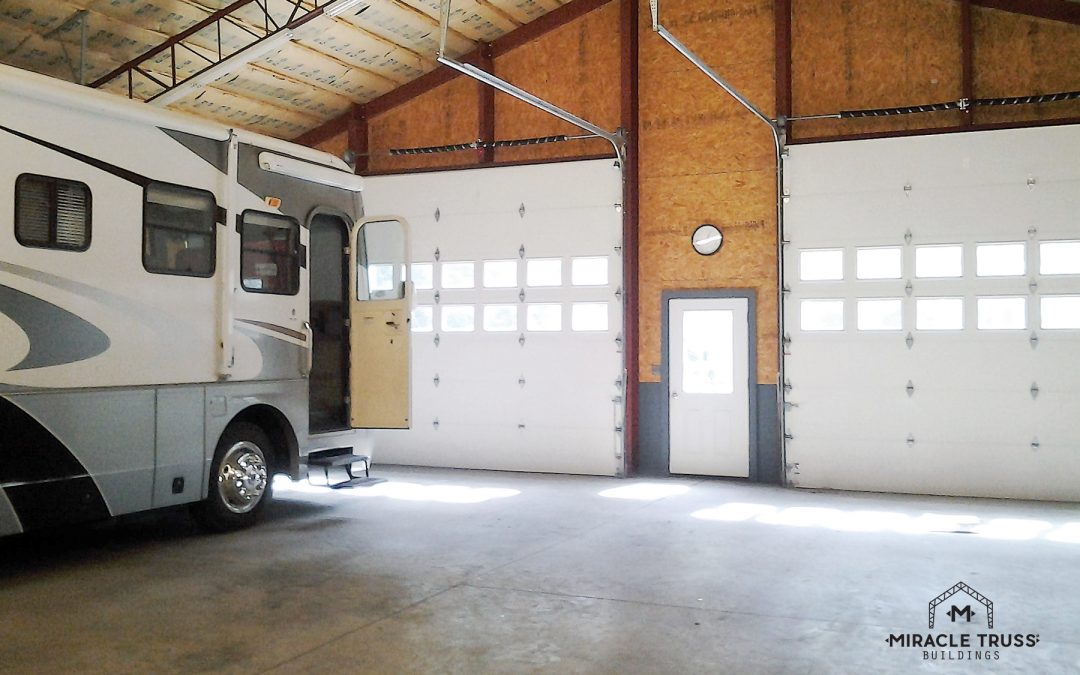You have probably seen the poor, sad looking RVs out there. They are everywhere.
The motorhome with extensive hail damage. The horribly sun-faded RV. The bird-poo covered Class A. The dirtier-than-a-swiffer travel trailer.
If you have an RV or are considering purchasing one, you want to protect your investment.
You have two choices for a camper cover:
- A material based RV cover
- An RV storage building
Which solution is right for your motorhome or camper?
Let’s go over the pros and cons of each RV storage solution so you can decide what’s right for you.
RV Carport / Building Storage

Having an RV garage for your camper or motorhome is a great way to protect your investment and to be able to enjoy your RV in a weatherproof space.
A metal RV carport or garage for your vehicle will be a LOT more convenient than an RV cover for protecting your motorhome or trailer.
Let’s look at the facts…
The Good
- Weather-Proof – your vehicle will be protected from rain, hail, sun and snow.
- Nothing to Store – an RV storage building is permanent. Nothing to put on, take off, to rip or to store.
- Easy Access/Convenience- especially if it’s hailing, snowing, or raining, if you fully enclose your RV with an RV garage, you can still access it comfortably (think man cave or she shed).
- No RV cover to dive under and wrestle with.
- Power – with an RV building or RV carport kit, you can install a dedicated power outlet to the building. Then you can plug in your RV to keep the batteries charged. This way you won’t have to use an extension cord. You can also power everything in your coach if it’s plugged in.
- Storage – with an RV carport kit or RV garage, you can make it large enough to also store your RV related accessories such as a tow dolly, towed vehicle, ladder and portable waste tank.
The Bad
- Expense – an RV carport will be much more expensive than buying one RV cover. However, it can add to the value of your property and can even add tax benefits.
- Extra Diligence – you will probably have to get a building permit to add an RV carport building to your property.
- Space – you may not have the space to erect an entire RV garage.
RV Covers

They’re made for all types of RVs from pop-ups to the largest Class A motorhomes.
You must pick the most durable material, or they won’t last for long. Incredibly, there are some brands out there which are not up to par and won’t last for even a couple of months if there’s any wind at all.
The big question is ‘will my RV cover really protect my RV?’
Here’s a look at the pros and cons of an RV cover.
The Good
- Reduced Maintenance- if you use a cover, you will have to clean your RV less often. Bird droppings, dirt, dust, and debris from trees and more will be stopped by the cover itself. In general, it will just stay cleaner than if it was left uncovered.
- Less Exposure – if a criminal cannot see what’s underneath your RV cover, they are much less likely to try to steal it or get into it.
- UV Damage Protection – we all know that the sun is very harsh on our man-made possessions. The sun can crack your vinyl decorations, destroy your awning, shorten the life of your tires, shrivel up your sealants on your roof, and much more. In general, it’s just best to keep your RV out of the harsh sun, especially in southern climates and the southwest.
The Bad
- Paint Scratching – no matter what kind of RV cover you get, there will be some scratching and rubbing of your paint from the wind rustling your RV cover.
- Not Waterproof – no RV cover is going to be totally waterproof. They can’t possibly be. If they were, mold and other issues would attack the inside and outside of your RV.
- Storage, Installation and Removal – this is especially significant If you have a large RV. Consider how much material is involved in covering a large class a motorhome. If it’s worth anything at all as far as protection and quality, it’s also going to be significant in weight. A cover for a 42’ motorhome will weigh around 50 pounds! Needless to say, covering an RV is not a one-man job. It will also require a lot of room to store.
- Physical Hazards – getting on top of your RV can be dangerous, especially when trying to maneuver a heavy RV cover while stepping around air vents, air conditioners, solar panels, etc.
- Life Expectancy – no matter how well an RV cover is made, they will not last more than a few years out in the elements, ESPECIALLY if you live in a harsh environment, such as the southwest. It will have to survive high winds, rain, snow and harsh sunlight. The best warranties only last for about 5 years. Take a guess why? The material will eventually (possibly sooner than later) rip and tear.
- Ventilation/aAccess Problems – depending on the your particular cover, it may be very challenging to get into the RV. Even if it has a door zip opening for the doorway, the windows aren’t likely to have openings. Therefore, mold issues could become a big problem, especially if you live in the south or east. This is a health problem that you do not want.
- Expense – for the length of time they are likely to last (not long), if you get a good quality one, they are still pricey.
- Hail – your RV cover won’t protect your vehicle from hail damage.
And the Winner Is…
A metal RV carport or garage for your vehicle will be a LOT more convenient and protective than an RV cover.
Personally, if I needed RV storage, I would get an RV storage building. If I couldn’t get a building, then I would just keep it uncovered.
Still, there are plenty of people who still opt for a cover. For some, it can be beneficial.
Regardless, the clear winner here is to protect your RV with an RV carport kit or an RV garage.
Kelly Beasley
Camp Addict Co-Founder
CampAddict.com
RvChickadee.com
Author Bio: Kelly Beasley is co-founder of CampAddict.com and loves sharing her enthusiasm for the RVing lifestyle. As a full-time RVer since May 2015, Kelly’s playful writing style helps make learning about the sometimes dull subject of RV products a bit more interesting.



